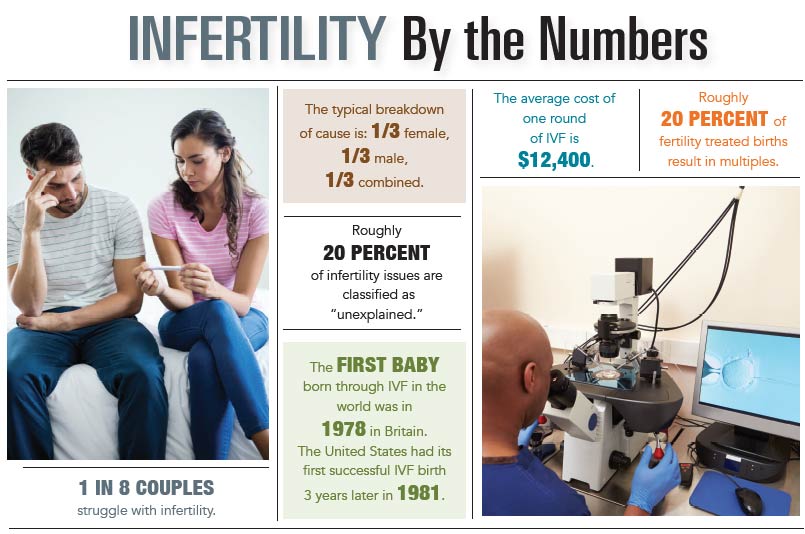Take one look around social media and you would be right to think that everyone around you is at some stage of growing their families. There seems to be pregnancy announcements around every corner – and, in fact, the 2017 Census stated that a baby was going to be born every eight seconds. However, for many men and women trying to conceive, it is still very much an uphill battle.Infertility is defined as not being able to become pregnant after one full year of trying to conceive through unprotected intercourse. For some, pregnancy comes easily; however, 6.1 million women report issues trying to conceive in the United States. Another common misconception is that infertility is only related to the female’s health. As it turns out, roughly 40 percent of infertility issues are linked to the male partner, according to the American Society for Reproductive Medicine.
The good news is that most infertility issues can be properly addressed, leading to successful pregnancies and healthy babies. To help get a better understanding of when to seek help – and what options are available – we turned to Dr. Denise Devine, a partner at Charleston Ob/Gyn, for answers.

Q. When should a couple begin seeking fertility help?
Dr. Devine: “It’s completely normal for the process to take a year to get pregnant if trying naturally and unassisted by medical intervention. However, age is a big factor in regards to infertility. As patients get older, the timeline for seeking help decreases. For example, if you are under 35, healthy and have regular cycles, a patient might try for a full year before making an appointment. However, once the woman hits 35, coming in after six months of trying to conceive probably makes sense.”
However, Dr. Devine said, “Trusting your body is paramount; if something feels wrong or the female partner has irregular periods, it’s always better to come in.”
Q: What are the most common obstacles to getting pregnant?
Dr. Devine: “Most of the time, it’s as simple as couples not timing intercourse correctly because they don’t understand the fertile window, which depends on cycle length. Once they have that understanding, it becomes a lot easier to track and plan your attempts at conceiving. There are even apps that can help with this now.”
Following that, typical obstacles include:
- Polycystic ovary syndrome (PCOS);
- Poor egg quality;
- Low sperm counts in men;
- Endometriosis;
- Blocked fallopian tubes.
Q: What medical options are available?
Dr. Devine: “There are a number of tests that we can perform to help diagnose the cause of someone’s infertility, including: checking the fallopian tubes, semen analysis, ultrasounds, blood work and understanding your family history. Once we have determined a reason, we can assist in conception through treatments, such as medications to help a woman ‘super ovulate’ for intrauterine insemination (IUI) or in vitro fertilization (IVF), which is the process of extracting eggs, fertilizing them with the sperm and then placing the embryos (fertilized eggs) back into the females. The first course of action, however, is always determining the actual problem at hand to find the solution.”
Q: How long does it take to conceive after seeking medical help?
Dr. Devine: “Typically, once a patient has been seeing a specialist, pregnancy occurs within three to six months. After seeing your OB/GYN, a woman will typically be referred to a fertility specialist who can then provide treatments such as IUI and IVF. Specialists typically recommend trying IUI for three consecutive months before moving onto IVF, which can be a longer process. However, it depends on the specific issues involved. It’s for these reasons that we recommend women over 35 to come in sooner, because every additional procedure required adds to the time it takes to conceive.”
Q: What is the success rate?
Dr. Devine: “There’s no one-size-fits-all treatment or success rate for infertility. Some women are even diagnosed with what is called ‘unexplained infertility,’ when there’s no clear answer to why she is not conceiving. The best thing to do is to be patient and keep the process of trying to conceive fun. The last thing you want is for it to be a stressor in your relationship and/ or life.”
Q: What are your top three lifestyle suggestions for couples trying to conceive?
Dr. Devine: “Maintaining a healthy weight is absolutely number one. Following that, we recommend increasing exercise (without overdoing it) and decreasing alcohol consumption. Additionally, it’s always important to address any medical issues prior to trying to conceive.”
Q: Any golden pieces of advice?
Dr. Devine: “Have healthy expectations about the process and give your body time. If you know you are going to be trying to conceive in the future, we actually recommend starting a prenatal vitamin or folic acid supplement a year prior to trying to conceive – though don’t stress out if you haven’t been. Just start now. Finally, if you’re truly concerned about the process, come into our office for a preconception counseling session to determine your risks and options.”








